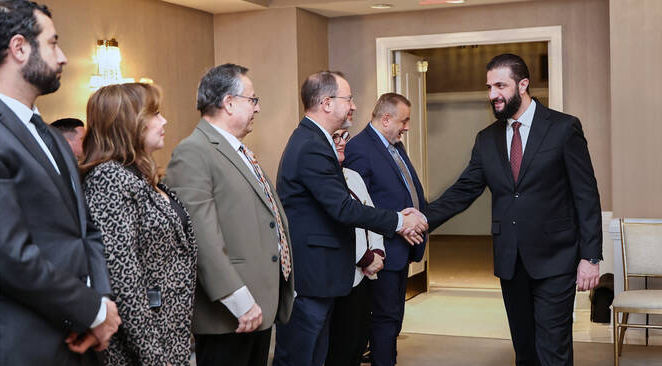Syria’s President Ahmed Al-Sharaa Makes Historic U.S. Visit After Removal from Terrorism Blacklist
Washington — Syrian President Ahmed Al-Sharaa arrived in the United States on Saturday for a landmark official visit, a day after Washington removed him from its terrorism blacklist, according to Syria’s state news agency.
Sharaa, whose forces ousted longtime ruler Bashar Assad late last year, is set to meet U.S. President Donald Trump at the White House on Monday. The visit marks the first by a Syrian head of state to the United States since the country’s independence in 1946, analysts said.
The interim Syrian leader previously met Trump in Riyadh in May during the U.S. president’s regional tour.
Washington’s envoy to Syria, Tom Barrack, said earlier this month that Sharaa was expected to sign an agreement for Syria to join the international U.S.-led coalition against the Daesh (Islamic State) group.
According to a diplomatic source in Damascus, the United States also plans to establish a military base near the Syrian capital “to coordinate humanitarian aid and observe developments between Syria and Israel.”
Delisting and Diplomatic Shifts
The U.S. State Department’s decision to remove Sharaa from the terrorism blacklist on Friday had been widely anticipated.
State Department spokesman Tommy Pigott said Sharaa’s government had made progress in addressing key American demands, including cooperation on locating missing U.S. citizens and eliminating any remaining chemical weapons stockpiles.
“These actions are being taken in recognition of the progress demonstrated by the Syrian leadership after the departure of Bashar Assad and more than 50 years of repression under the Assad regime,” Pigott said.
He added that removing Sharaa from the blacklist would promote “regional security and stability as well as an inclusive, Syrian-led and Syrian-owned political process.”
Crackdown on Daesh
Syria’s interior ministry announced on Saturday that it had carried out 61 raids and made 71 arrests in a “proactive campaign to neutralize the threat” of Daesh, according to the state-run SANA news agency.
The ministry said the operations targeted suspected Islamic State sleeper cells across several provinces, including Aleppo, Idlib, Hama, Homs, Deir ez-Zor, Raqqa, and Damascus.
Following his arrival in Washington, Sharaa met with representatives of Syrian community organizations in the U.S. capital, Syrian media reported.
In a lighthearted moment ahead of his departure, Syrian Foreign Minister posted a video on social media showing Sharaa playing basketball with U.S. CENTCOM Commander Gen. Brad Cooper and Kevin Lambert, head of the international anti-Daesh coalition in Iraq, with the caption: “Work hard, play harder.”
From Rebel Commander to Statesman
Sharaa’s visit to Washington follows his appearance at the United Nations General Assembly in September — his first trip to U.S. soil — where he became the first Syrian president in decades to address the assembly in New York.
On Thursday, the U.S. led a Security Council vote to lift U.N. sanctions against him.
Once affiliated with Al-Qaeda, Sharaa formerly led the militant group Hayat Tahrir Al-Sham (HTS), which was delisted as a terrorist organization by Washington in July.
Since seizing power, Syria’s new leadership has sought to distance itself from its extremist roots and project a more moderate, internationally acceptable image.
“The White House visit is further testament to the U.S. commitment to the new Syria and a hugely symbolic moment for the country’s new leader, who thus marks another step in his astonishing transformation from militant leader to global statesman,” said Michael Hanna, U.S. Program Director at the International Crisis Group.
Reconstruction Challenges Ahead
Sharaa is expected to seek international funding for Syria’s post-war reconstruction during his visit. The country faces enormous economic and humanitarian challenges after 13 years of civil conflict.
In October, the World Bank estimated the cost of rebuilding Syria at a “conservative best estimate” of $216 billion.
As Washington and Damascus cautiously rebuild diplomatic ties, Sharaa’s visit signals what many observers see as a historic turning point — both for Syria’s reemergence on the world stage and for a region long defined by conflict and isolation.



